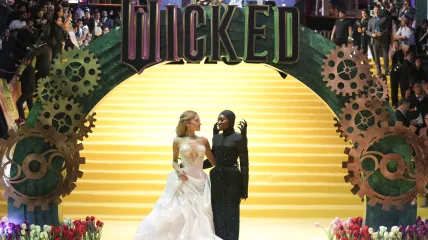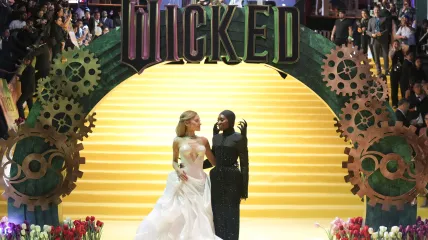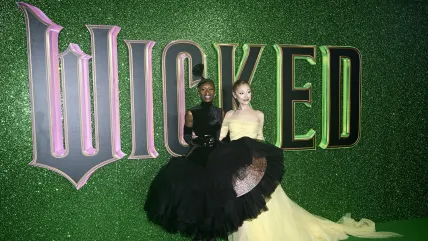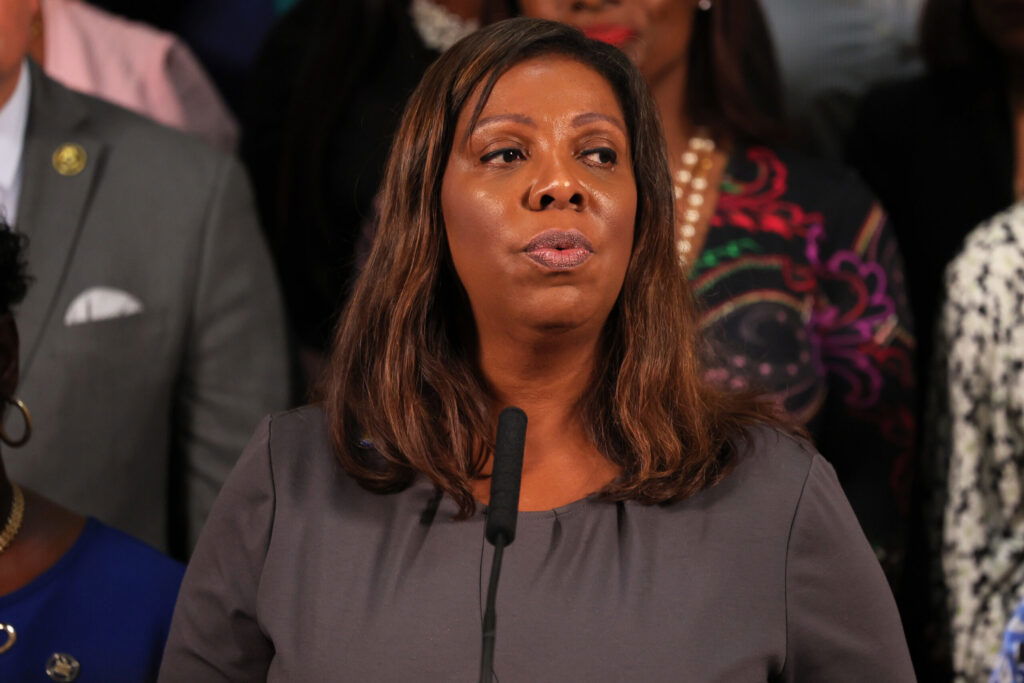Editor’s note: The following article is an op-ed, and the views expressed are the author’s own. Read more opinions on theGrio.
I’ll be honest — I haven’t wanted to talk much about politics since November 6. It’s not that there isn’t much to say, but like many Black women who’ve been ringing alarm bells about the state of the country, I’m now leaning into Tricia Hersey’s philosophy that “rest is resistance” and choosing to prioritize my local communities and issues close to home.
So imagine my surprise when I went to see the movie “Wicked” for relaxation — as a total newbie with no background on the movie, book or Broadway show (other than seeing the popular greenfaced poster plastered everywhere back when I couldn’t afford a ticket) — and discovered the movie had a political message laced through two hours and 40 minutes of spectacular singing, dancing and acting by Cynthia Erivo, Ariana Grande, and the entire cast.
It turns out Gregory Maguire, the author of the book “Wicked” is based on, was inspired by the political events of the late ’90s and early aughts — including the Gulf War waged between Bush and Saddam Hussein, asking questions of how people characterize “good” vs. “evil,” and how “others” are treated. Maguire wrote his adaption based on Frank L. Baum’s famous movie “The Wizard of Oz,” which also had political motivations. The political apple didn’t fall far from the tree.
McGuire did what the great Toni Morrison advised artists to do in hard times, saying “There is no time for despair, no place for self-pity, no need for silence, no room for fear. We speak, we write, we do language” because “that is how civilizations heal.” It was a spot-on message that made perfect sense in 2004 when Morrison had the epiphany after George W. Bush won re-election, and makes just as much sense in 2024 when a former president has been reelected, threatening to usher in a new level of “retribution,” turmoil, and American unrest.
Perhaps this is one of the key takeaways we should have after the election: that history predictably repeats itself. In fact, history is so predictable that a Broadway show like Wicked,” which has been around for more than 20 years, spelled out the details of this 2024 political moment with such accuracy, you would think the writers involved were psychics and not just authors.
That said, I present five of the many lessons from Wicked” that felt like a political sermon as I sat in that movie theater watching Elphaba and Glinda fly across our screens, warning us about “something bad” happening in Oz…but also here on the homefront.
WARNING: This article contains spoilers. Please spend your $14.99 and get a bucket of popcorn before reading so that nothing takes away from your moviegoing experience.
1. Just like they banned certain books and knowledge in Oz, Black history and other histories are being banned or censored to rewrite our understanding of ourselves and our country
“Wicked” is all fun and games until things start to get real in Oz — specifically, when some professors, who are actual animals, are told they can’t teach certain lessons anymore. Dr. Dillamond, a goat, does his best to educate his students against all odds, but even Elphaba (Cynthia Erivo) discovers that he has to meet in secret with other animals to speak freely about the truth.
“We animals are now being blamed for everything that goes wrong, forced from our jobs, told to keep silent,” he told his fellow animals.
Americans are watching in real-time as books are banned from libraries and schools, with threats of firings and even arrests of librarians for allowing access to certain works. While some media have labeled these examples of “culture wars,” they are proven signs of a democracy being threatened.
When AP African American History is shut down in Florida and lessons about slavery frame enslaved Africans as benefitting from the skills they learn, it’s a true attempt to keep people in the dark about what came before, so they can’t make connections to the present.
2. When people are angry, they look for a scapegoat (no pun intended)
Throughout “Wicked,” we see Elphaba made out to be feared because of the color of her skin — a perfect analogy for what Black people go through every day, around the world.
But it wasn’t just Elphaba who was ostracized for her looks. The animals and top goat, Dr. Dillamond, became seen as others who didn’t deserve to teach, let alone be heard, because they were a different species.
This election cycle, we were bombarded with messages about “invasions” and America being under attack because of illegal “aliens.” While experts agree America’s immigration system is certainly broken, the dehumanization of immigrants and false claims of legal Haitian immigrants “eating pets” were intended to create a scapegoat that voters could be angry with.
Immigration went from being a lower priority issue in public polling to the highest in ten years, and it wasn’t by accident. The news and social media were used to stir up even more anxiety about the border, making immigrants of color appear to be our country’s biggest problem. Meanwhile, there was little mention of immigrants from European countries.
“Wicked” the film would’ve been even more spot-on if at least one animal had been characterized as not a smelly animal like those other ones — because those other animals should be sent back to the forest they came from!
3. True allies will stand by you; others always fall back on privilege
Watching the transformation of Elphaba and Glinda’s relationship throughout the film felt like watching a true friendship blossom. The once self-centered, wealthy, socially acceptable Glinda seemed to have built a genuine relationship with the green-faced, micro-braided Elphaba — once she got past her own selfish motives, of course. Glinda even went so far as being seen with Elphaba in places where they normally would’ve kept a distance — performative allyship where?!
But in the end (spoiler alert again), the pull of acceptance and the status quo would ultimately win and Glinda just couldn’t revolt alongside Elphaba.
Similarly, it seemed at the culmination of Election 2024, Black women voters struggled to get a strong enough showing of allyship from women of other flavors and persuasions, despite all women being in the same boat of a post-Roe reproductive rights rollback.
Much ado was made about the coalition of Black, (non-Black) Hispanic, Asian, and white progressive voters who had the power to put a Black woman in the White House if they stuck together. Despite Harris’ efforts to woo white women voters and her success in persuading white college-educated women voters to support her, 53% of white women voters still supported the other candidate.
Non-Black Latina women had a stronger showing of 58% for Harris, but it still wasn’t a game-changing majority
Meanwhile, the 92% of Black women who voted for Harris were left alone on the ledge with our capes, while many of our allies said they understood our shared struggle, but the cost of eggs took precedence, and Trump’s racism and sexism just weren’t enough to make them defy gravity.
4. The powers that be want the public distracted and occupied with trivial things, so there’s no room or energy for fighting back
There’s a scene in “Wicked” where the Wizard explains that he knows how to make people happy and do what’s best for them: by simplifying their choices and keeping them occupied.
In the case of Election 2024, we saw a major break with the tradition of mainly relying on legacy media outlets to provide vetted and accurate political news. Instead, partisan voices dominated the discussion even more, and many people mindlessly consumed propaganda, memes and podcasts produced by just about anyone (predominantly unvetted sources) based on whatever their algorithms put in front of them.
One man even paid billions to own a literal algorithm, burying the platform known as Twitter and resurrecting it as “X,” then letting it be flooded with false info and radical hate speech.
At certain points, political news was so contentious, ridiculous, and silly (We really had to read headlines about Arnold Palmer’s genitalia and VP Harris’ race?) that many people ultimately checked out.
You might think it was by design.
5. As soon as the ‘other’ speaks up for their rights, they become public enemy number one.
One of the most striking scenes in the movie “Wicked” is when Madame Morrible (Michelle Yeoh) hops on the loudspeaker and denounces Elphaba — the same young woman she promised to mentor and look out for — when Elphaba had something she wanted.
You can see the pain and look of betrayal crossing Elphaba’s face as it sets in that no matter what she does or says, she will be painted as the enemy.
At this point, she has no choice but to flee or accept her fate.
That feeling of betrayal is something that Black Americans, especially descendants of chattel slavery in the United States, have felt time and again.
We felt it during continued enslavement after the Emancipation Proclamation, oppression during Reconstruction or during the civil rights movement, and now, as we see DEI initiatives rolled back, affirmative action overturned, and all the promises of the George Floyd and Black Lives Matter era evaporate into thin air. As politicians weaponize the word “woke” against communities who have only challenged America to live up to its promises, we are more than used to it.
Black Americans are currently looking at the Madam Morribles of America who call us “woke” and unpatriotic, and those who may look down on us or make us the butt of jokes — much like Elphaba was when she listened to her former mentor sic the flying monkeys on her while calling her an enemy.
The symbolism is what makes a character like Elphaba and a story like “Wicked” so powerfully moving decade after decade, no matter who dons the green face paint.
As I left the movie theater, that final lesson hit home the hardest.
Elphaba’s peace with the public’s commitment to misunderstanding her and her choice to resist expectations of assimilation or compliance — instead choosing to stand up for a greater principle — are reminders of the cost of courage.
The cost is real, especially as 2025 looms with the inauguration of a president who has promised to punish those who get in his way.
For so many Black people who showed up for Election 2024, giving all of themselves for the cause of freedom and democracy, they know what courage costs.
Now, they are prioritizing safety, survival and self-care, while others are choosing to stay and fight a different fight in the era to come.
Either choice can be seen as defying gravity — a concept written about by a legendary author long before the characters in “Wicked” ever sang about it.
To again quote Toni Morrison:
“You wanna fly, you got to give up the sh*t that weighs you down.”
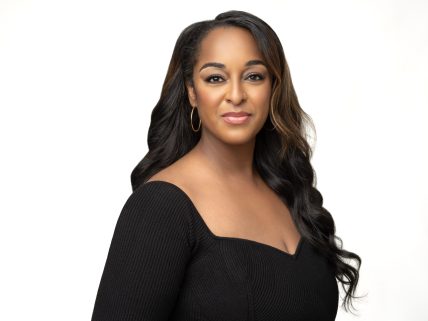
Natasha S. Alford is the Senior Vice President of TheGrio. A recognized journalist, filmmaker and TV personality, Alford is also author of the award-winningbook, “American Negra.” (HarperCollins, 2024) Follow her on Twitter and Instagram at @natashasalford.


